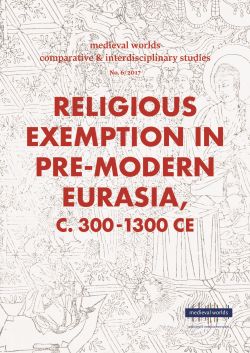|
 |
MEDIEVAL WORLDS provides a new forum for interdisciplinary and transcultural studies of the Middle Ages. Specifically it encourages and links comparative research between different regions and fields and promotes methodological innovation in transdisciplinary studies. Focusing on the Middle Ages (c. 400-1500 CE, but can be extended whenever thematically fruitful or appropriate), MEDIEVAL WORLDS takes a global approach to studying history in a comparative setting.
MEDIEVAL WORLDS is open to regular submissions on comparative topics, but also offers the possibility to propose or advertise subjects that lend themselves to comparison. With a view to connecting people working on related topics in different academic environments, we publish calls for matching articles and for contributions on particular issues.
Table of Contents
Religious Exemption in Pre-Modern Eurasia, c. 300 – 1300 CE: Introduction
Charles West
Treasures in Heaven: Defining the Eurasian Old Regime?
R. I. Moore
Envisioning a No-Man’s Land: Hermitage as a Site of Exemption in Ancient and Early Medieval
Indian Literature
Kanad Sinha
Evolving Relationship between the Buddhist Monastic Order and the Imperial States of Medieval
China
Mario Poceski
The Normative Character of Monastic Exemption in the Early Medieval Latin West
Kriston R. Rennie
Clerical Exemption in Canon Law from Gratian to the Decretals
Anne J. Duggan
Nothing to Declare: Status, Power and Religious Aspiration in the Policies of Taxation in Ancient
India
Ulrich Pagel
Exemption Not Granted: The Confrontation between Buddhism and the Chinese State in Late
Antiquity and the ‘First Great Divergence’ Between China and Western Eurasia
Antonello Palumbo
The Political Significance of Gifts of Power in the Khmer and Mercian Kingdoms 793-926
Dominic Goodall and Andrew Wareham
Conversion, Exemption, and Manipulation: Social Benefits and Conversion to Islam in Late Antiquity
and the Middle Ages
Uriel Simonsohn
Religious Exemption, Justice, and Territories around the Year 1000: The Forgeries of Worms
Thomas Kohl
The Exemption that Proves the Rule: Autonomy and Authority between Alcuin, Theodulf and
Charlemagne (802)
Rutger Kramer
From Symbiosis to Separate Spheres? England, 1163
Judith A. Green
Religious Exemption and Global History before 1300 – Closing Comments
Julia McClure
|




 Home
Home Print
Print
 References
References
 Share
Share
